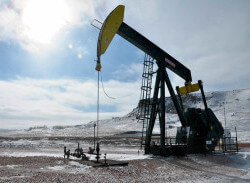 The government pledged to restrict fracking in national parks, yet in July it reneged on it’s pre-election promise to protect the thousands of wildlife sites in the UK.
The government pledged to restrict fracking in national parks, yet in July it reneged on it’s pre-election promise to protect the thousands of wildlife sites in the UK.
Nearly 300 sites of special scientific interest (SSSI), home to rare animals and plants, have now been opened up to fracking by the Tory government. This is a far cry from Rudd’s promise back in January:
“We have agreed an outright ban on fracking in national parks [and] sites of special scientific interest”.
The DECC have argued that the shale gas industry would be held back if SSSIs were excluded. In fact, they’ve already issued licences to explore for oil and gas in 293 sites of special scientific interest, which has raised concerns over the impact on habitats for rare wildlife and plants.
Martin Harper, director of conservation at the RSPB, said the government had backtracked on its pledges to protect important habitats.
“In February, Amber Rudd specifically promised to ban fracking within all sites of special scientific interest, but this promise seems to have been forgotten.
We simply don’t understand why SSSIs – some of the UK’s best and most sensitive wildlife sites and landscapes – aren’t being offered full protection from fracking, when national parks, world heritage sites and areas of outstanding natural beauty are being excluded from fracking completely.”
This is bad news for wildlife enthusiasts and just gives further ammunition to opposition parties and environmentalists.
Caroline Lucas, the Green party MP, said:
“The government’s U-turn on protecting the UK’s most precious wildlife sites from fracking is outrageous. It’s yet another illustration that ministers simply cannot be trusted when it comes to fracking.”
Daisy Sands, head of energy at Greenpeace UK, agrees:
“With a few days before recess, this looks like nothing but a blatant attempt to bypass democracy to sneak this deeply unpopular policy in through the back door while no one is looking. Ministers have given concerned citizens up and down the country no opportunity to voice their opposition to the plans that could ruin the countryside, contaminate the water supply and have a devastating impact on the climate.”
It looks like this is just the beginning with hundreds more of SSSIs now at risk. Fracking has always been a controversial subject with much opposition from local communities due to the unknown effects on the surrounding area.
The RSPB said that fracking at sensitive wildlife sites could cause disruption, habitat loss and fragmentation, and disturbance to wildlife from noise and light pollution, as well as potential effects on the water supply.
It seems the DECC remain unperturbed with a spokesman stating:
“We consider that their [SSSI’s] protections are adequate under the planning system. Developments won’t normally be permitted if they were going to have an adverse impact on a SSSI. The number of them would have an adverse effect on the development of the shale gas industry.”
They argue that fracking will still be excluded from national parks, areas of outstanding natural beauty, the Broads and world heritage sites under the new plans.
However this doesn’t give environmentalists much peace of mind as shale companies will still be allowed to put a rig outside a national park and drill horizontally underneath it.
This step towards invading wildlife sites is likely to bring about an onslaught of opposition towards the government and pressure to annul the licences before they are finalised.
We’ll be interested to see how the government reacts in the face of this and if they ease up on renewables legislation to soften the blow.
For more information on renewable energy, give Business Juice a call on 0800 051 5770.
